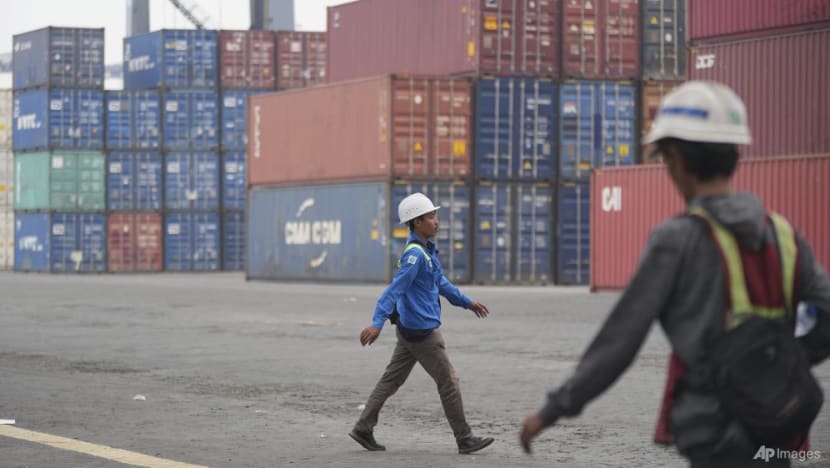Commentary: TrumpŌĆÖs tariffs are an opportunity for Indonesia to advance its interests
To mitigate the negative impact of US tariffs, Indonesia must adjust its economic strategy and seek new markets, says RSISŌĆÖ Adhi Priamarizki.

Workers walk by as shipping containers are stacked at Jakarta International Container Terminal (JICT) at Tanjung Prior Port in Jakarta, Indonesia, Apr 11, 2025. (AP Photo/Tatan Syuflana)

This audio is generated by an AI tool.
SINGAPORE: Indonesia was among the countries targeted by United States President Donald TrumpŌĆÖs sweeping tariffs announced on Apr 2. It faces a 32 per cent tariff, the sixth highest in Southeast Asia.
This move sparked fears over a potential recession and had a negative impact on the stock market across Asia. The Indonesian stock market dropped 9 per cent on its first trading day (Apr 8) following the Hari Raya holiday period.
In response to the financial chaos, Mr Trump decided to delay the implementation of the tariffs for most countries by 90 days.
Despite the seemingly challenging circumstances, US tariffs may present a window of opportunity for Indonesia to advance its strategic and economic interests.
The Indonesian government pledged that Jakarta will not retaliate against Mr TrumpŌĆÖs tariffs. Instead, it would seek to negotiate and import more US products such as wheat, cotton, oil and gas.
President Prabowo Subianto has expressed his intention to explore new markets and strengthen domestic ones to mitigate the negative impact of US tariffs. He also met Malaysian Prime Minister Anwar Ibrahim on Apr 6 to discuss the new US tariffs and other matters related to the Association of Southeast Asian Nations (ASEAN).
NEGOTIATING WITH WASHINGTON
The Trump tariffs give Indonesia impetus to adjust its economic strategy through diversification of cooperation and partnerships. Such moves help to bolster the countryŌĆÖs ŌĆ£free and activeŌĆØ foreign policy as well, through which Indonesia stays impartial to major powers while exerting its influence in regional affairs. ┬Ā
First, the tariffs are an opportunity to strengthen the US-Indonesia relationship. Although the leaders have not met to date, Mr Prabowo called Mr Trump to congratulate him on his election victory, and both men exchanged warm words.
The US remains one of IndonesiaŌĆÖs key security and economic partners. In 2023, the two countries elevated their relationship status into a ŌĆ£comprehensive strategic partnershipŌĆØ, pledging to work towards a stronger and more prosperous Indo-Pacific.
While this was struck during their predecessors Joko WidodoŌĆÖs and Joe BidenŌĆÖs tenures, Indonesia should consider reiterating the partnership and discussing its future direction when negotiating with the US on trade. By doing this, Indonesia not only emphasises itself as a reliable US partner in Southeast Asia but also reminds Washington of its commitment to the region.
Moreover, it is plausible for Indonesia and the US to explore new areas of trade, such as on critical minerals, which Indonesia is a major producer of.
Second, JakartaŌĆÖs plan to negotiate with Washington should take into account IndonesiaŌĆÖs ambition to join the Organisation for Economic Co-operation and Development (OECD) by 2027.
Indonesia has officially joined BRICS┬Ābut is still eyeing OECD membership for its long-term economic development. The hope is that OECD membership will attract foreign investment and strengthen IndonesiaŌĆÖs position in the global semiconductor ecosystem.
To join the OECD, Indonesia must align its regulations with the blocŌĆÖs standards for governance and transparency. Adjusting its economic policies to respond to US tariffs could also serve its bid for OECD membership.
A COHERENT ECONOMIC STRATEGY
Third, the tariffs can drive Indonesia to formulate a coherent economic strategy. Indonesia faces a potential economic slowdown and Mr PrabowoŌĆÖs ambitious national agenda, notably the free meals programme and construction of 3 million houses, require funding.
It is a good time for the Prabowo administration to consolidate a team to balance the presidentŌĆÖs nationalistic tendencies with practical solutions to the countryŌĆÖs pressing economic challenges.
Mr Prabowo may wish to make full use of the National Economic Council, transforming the role of an adviser from a largely symbolic position into one of meaningful engagement and influence.
In addition, the situation can push Indonesia to explore doing business with other regions. Mr Prabowo has mentioned the possibility of Africa as a new market due to its large population and abundant resources.
Indonesia itself has exported a wide range of products to African countries, ranging from instant noodles to airplanes. For example, IndonesiaŌĆÖs aerospace company (PT DI) has exported its aircraft to Senegal and the Democratic Republic of Congo.
The Prabowo administration must take advantage of the 90-day pause to prepare for whatever lies ahead. Indonesia needs to develop a comprehensive response to address the challenges posed by US tariffs, utilising both political and economic tools.
It should consider working with other countries to formulate a collective response. Working with ASEAN member states through the institutionŌĆÖs mechanisms might provide solutions.
This moment presents an opportunity for Indonesia to recalibrate its economic policies, step up its regional influence and enhance its role in promoting ASEAN unity.
Adhi Priamarizki is Research Fellow at the Indonesia Programme of S Rajaratnam School of International Studies (RSIS), Nanyang Technological University, Singapore.













